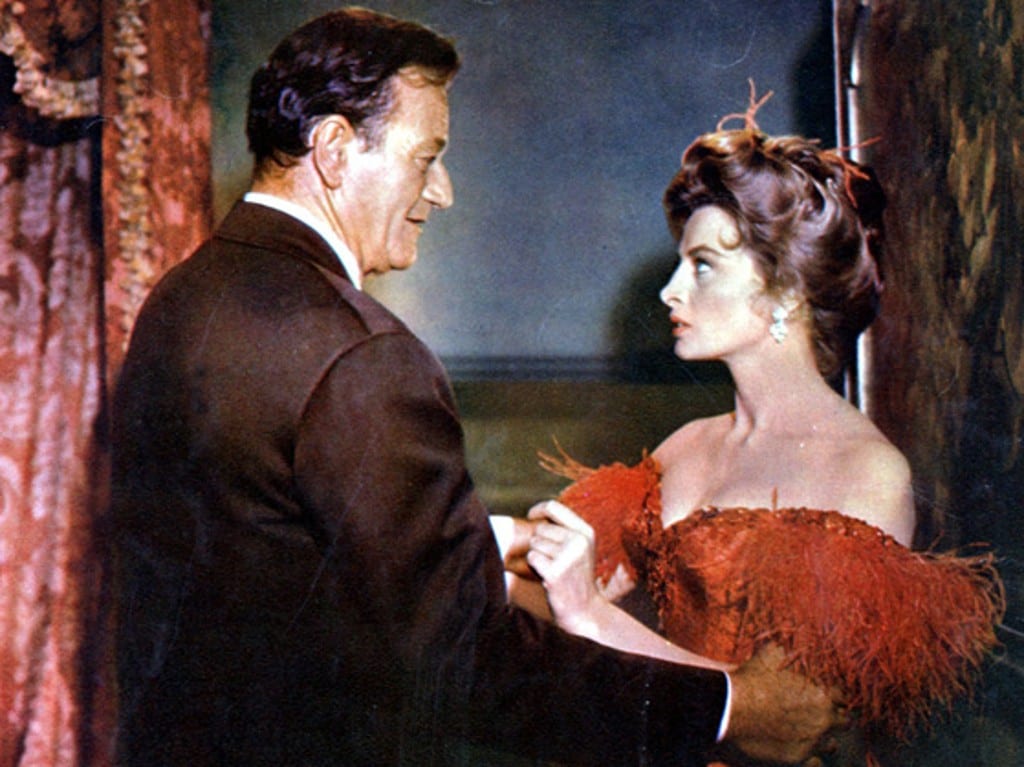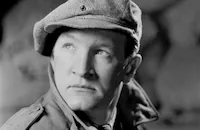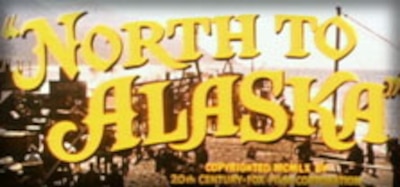North to Alaska

Brief Synopsis
Cast & Crew
Henry Hathaway
John Wayne
Stewart Granger
Ernie Kovacs
Fabian
Capucine
Film Details
Technical Specs

Synopsis
After partners Sam McCord and George Pratt strike it rich with their Nome, Alaska gold mine, George's only wish is to marry his French fiancée Jenny, who has been patiently waiting for him for three years in Seattle. While George stays behind to build a honeymoon cabin and guard against claim jumpers with his rambunctious younger brother Billy, Sam, a womanizing, confirmed bachelor, sails to Seattle to purchase some needed machinery and to collect Jenny for George. Before sailing, Sam is approached by conman Frankie Canon, who asks for a loan, offering his "priceless" diamond pinky ring as collateral. When the diamond is smashed to smithereens by an errant whiskey bottle, Sam realizes he has been swindled and slugs Frankie. In Seattle, Sam discovers that Jenny has married a lowly butler, and when Jenny hears that the man she jilted is now a millionaire, she faints. Reluctant to break the bad news to George, Sam goes to drown his sorrows at a dance hall called the Henhouse. There he meets Michelle Bonet, known as "Angel," an attractive French hostess, and hits upon the idea of offering her to George as a substitute for Jenny. When Sam offers Michelle Jenny's trousseau and half a gold mine to travel to Alaska with him, she eagerly accepts. Afterward, Lars Norquist, Sam's old logging boss, comes to the Henhouse to invite Sam to the loggers' picnic. At the picnic, a drunken logger makes unwanted advances toward Michelle, who is moved when Sam slugs the mauler. By the time the evening ends, Sam passes out drunk and Michelle is beginning to fall in love with him. Michelle helps Sam onto the boat, and when he awakens, they are on their way to Alaska. Michelle, who believed that Sam wanted her as his companion, is heartbroken when he informs her that he has recruited her for George. After angrily locking herself in her cabin, Michelle reconsiders and agrees to make George happy, but Sam, who is now falling in love with Michelle, vetoes the idea and books her passage back to Seattle. When the boat docks in Nome, however, Michelle disembarks and follows him. Dreading his meeting with George, Sam is relieved to learn that his partner is embroiled in helping Arnie, a neighboring miner, fend off some claim jumpers. Sam then arranges a room for Michelle at the Palace, the hotel that Frankie has recently won in a crooked card game. After Sam leaves, Frankie, who had known Michelle in New Orleans where he jilted her after an intense affair, propositions her, but she rebuffs him. On his way out of town, Sam hesitates in front of Michelle's hotel room window, and when she sees him, she pretends that she is being attacked, sending Sam rushing up the stairs to her rescue. After Sam loads Michelle and her luggage into his wagon, Frankie enlists Peter Boggs, the drunken hotel porter who once lived on the land owned by Sam, in a scheme to stake a fake claim on the mine. Upon reaching the mine, Sam leaves Michelle in Billy's care while he rides off to help George. Billy, wide-eyed and amorous, tries to romance Michelle over dinner, but passes out drunk. At Arnie's mine, Sam crashes from the hills in an out-of-control rail wagon, sending the claim jumpers scurrying. When George learns that Jenny is married, he rushes off before Sam can mention Michelle. Galloping back to the cabin, Sam finds Michelle asleep in the honeymoon bed and Billy passed out on the cabin floor. Bent on ensnaring Sam, Michelle awakens and asks him to button her blouse, and when George enters the house, he finds her in a state of undress and accuses her of being a tramp. When Sam stammers that he brought Michelle to console him, George, smitten by her French accent, asks her to stay. After Michelle refuses and asks to be taken to town, George realizes that she is in love with Sam and he with her. Determined to bring the love birds together, George tries to make Sam jealous by whiling away the evening alone with Michelle in the honeymoon cabin. As romantic tunes waft through the night air, Sam charges into the cabin, slaps George and calls Michelle a floozy. The next day, a band of soldiers arrives to notify Sam and George that their claim has been cross-filed. When Sam insists on taking his share of the gold and leaving, the soldiers arrest him and take him to town and Michelle asks if she can ride along. There, she learns that the boat is to sail at midnight and accepts Frankie's offer to wait in his hotel room. When Frankie mentions that he has been expecting her, she realizes that he must be behind the plot to seize the mine. When the commissioner informs Sam that Boggs is challenging his claim, Sam barges into Frankie's room in search of the porter. Finding Michelle there, he accuses her of a double-cross and she apprises him of Frankie's role in Boggs's claim. After finding the drunken Boggs locked in a room, Sam is about to drag him to the commissioner's office when Frankie pulls up in front of the hotel, sparking a raucous fight in the mud-clogged streets. After Sam douses Frankie in the mud, the boarding call is sounded for Michelle's boat. As Michelle heads for the docks, Sam forbids her to go, and when she asks why, he finally shouts that he loves her, after which she jumps into his arms

Director

Henry Hathaway
Cast

John Wayne

Stewart Granger

Ernie Kovacs
Fabian

Capucine

Mickey Shaughnessy
Karl Swenson

Joe Sawyer

Kathleen Freeman

John Qualen
Stanley Adams
Frank Faylen
Fred Graham
Alan Carney
Maurice Delamore
Peter Bourne
Fortune Gordien
Roy Jensen
Charles Seel
Rayford Barnes
Jack Orrison
Pat Hogan
Harry Arnie
Jimmy Ames
Stephen Courtleigh

Douglas Dick
Jerry O'sullivan
Ollie O'toole
Marilyn Lindsay
Sheila Moser
Jodi Desmond
Arline Hunter
Barbara Hines
Hope Dubois
Lari Lane
Jo Helton
Gloria De Winter
Connie Buck
Patti Lawler
Alyce Allwyn
Narda Onyx
Joey Faye
Monte Burkhart
Tom Hennesy
Esther Dale
Barbara Mansell
Gloria Scott
Yvonne Peattie
Ruth Perrott
George Diestel
Victor Tayback
Oscar Beregi
Richard Collier
Jack Jobson
Richard Deacon
Max Mellinger
Arlene Harris
Pamela Raymond
Ray Weaver
Marcel Hillaire
Lilyan Chauvin
Patty Wharton
Johnny Lee
Ann Duggan
Tom Dillon

James Griffith
Tudor Owen
Stan Johnson
Mal Harper
Stan Lyon
Harold Hap Johnson
Renny Mcevoy
Hobo, A Dog
Crew
L. B. Abbott
Claude Binyon
Teresa Brachetto
Alfred Bruzlin
William Buffiner
Duncan Cramer
Lee Crawford
Peter De Angelis
Warren B. Delaplain
Josephine Earl
Bill Eckhardt
Russell Faith
Bert French
Henry Gerzen
Don Greenwood
Fred Hall
Henry Hathaway
Stanley Hough
Ollie Hughes
Ellis Johnston
Emil Kosa Jr.
John Lee Mahin
Robert P. Marcucci
Bernard Mayers
Leo Mccreary
Lionel Newman
Ben Nye
Webb Overlander
Guy Peyton
Mike Phillips
Mildred Quinn
Martin Rackin
Stuart A. Reiss
Irving Rosenberg
Emmet Schoenbaum
Walter M. Scott
Leon Shamroy
Fred Simpson
Jack Martin Smith
Dorothy Spencer
John Stephens
Richard Talmadge
Urban Thielmann
Bill Thomas
Wesley Trist
Helen Turpin
Monte Westmore
Eddie Wynigear

Film Details
Technical Specs

Articles
North to Alaska
The only person who seemed pleased with this situation was costar Ernie Kovacs, always a connoisseur of the absurd. "This is great," he told a New York Times reporter as he lounged by a pool in dark glasses and swimming trunks. "I've been here since 9 this morning and we're behind schedule, so I haven't even put on my costume. I didn't do anything during the actors' strike and now I'm back at work and I'm still not doing anything. It's a great way to make a living." He soon found himself back before the camera, though, and biographer Diana Rico says that the climatic scene - a rowdy fight on a mud-covered street - entailed "the most physically demanding work of his career."
North to Alaska begins in 1900 in Nome, a ramshackle settlement that resembles an ordinary frontier town except that it's always chilly outside. Hunting for gold is the leading industry and most of the inhabitants are prospectors, former prospectors, failed prospectors, or people about to become prospectors. John Wayne and Stewart Granger play Sam McCord and George Pratt, partners who have made a strike, staked their claim, and started dreaming of the luxuries their newfound fortune will bring. Sam hops a boat for Seattle with two errands to accomplish: purchasing equipment for the mine, and bringing George's beloved Jenny back to Nome so they can get married and move into the comfy little cabin George is building.
Arriving at the magnificent Seattle mansion Jenny lives in, Sam is disappointed to discover she's only the maid - and worse yet, she's already married, to the butler. Not wanting to let George down, Sam visits a local establishment called the Hen House and finds a Jenny substitute, confident that she'll please his partner equally well. Her name is Angel, and although she's obviously a hooker, she has a winning manner, a beautiful face, and a lovely French accent. She agrees to the arrangement, but when they get to Nome complications ensue. Claim jumpers are killing miners and filing bogus documents; Angel has fallen in love with Sam; George's teenage brother Billy has fallen in love with Angel; and Angel turns out to have a secret past with Kovacs's character, Frankie Canon, an incorrigible con artist.
Wayne was less amused by the production delays than Kovacs was. As all the world knows, Wayne has been Hollywood's quintessential American hero since at least 1939, when John Ford's classic Stagecoach turned him from a trusty action-adventure actor into a blazing international star. Like the plots of many Wayne pictures, however, that storyline is too simple to be entirely plausible. His career had valleys as well as peaks, stormy days as well as pleasant ones. A difficult stretch came around 1960, when he had poured the resources of Batjac, his production company, into The Alamo, a pet project that filled the screen with twelve million dollars' worth of action, violence, and patriotism, losing a fortune and shooting down much of Wayne's personal wealth in the process.
In his early fifties and looking his age, Wayne scrambled to recoup his losses by doubling down in the genre he knew best. His westerns of the early 1960s range from epic ones like How the West Was Won (1962) to forgettable ones like McClintock! (1963) and brilliant ones like The Man Who Shot Liberty Valance (1962), all of which turned a profit. Among them was North to Alaska, which not only made money but partly shaped the later phase of Wayne's career, helping him reinvent himself as a cowboy with a comic touch and pointing the way to True Grit (1969) and Rooster Cogburn (1975), the first of which won him his only Academy Award.
North to Alaska is as wild and woolly as its Klondike setting, but it's constructed as neatly as a well-engineered goldmine. The action is bookended by big fights, one played for laughs in a saloon, the other played for guffaws in the mud. The story commences in Nome, travels to Seattle on a nicely outfitted ship, and returns to Nome; then at exactly the halfway mark it leaves municipalities behind and moves to spacious mining country, remaining there until just before the end. The sets are believable, the scenery is handsome, the CinemaScope is splendid, and the costumes are elegant enough to look extraordinarily messed up when they land in that muddy street. Few would claim Hathaway as a major auteur, but he had all the skills needed to turn out a smoothly running entertainment machine like this.
Wayne had displayed a sense of humor in earlier pictures, but North to Alaska is perhaps the most effective showcase his comic abilities had yet received. His timing is terrific, his face is more elastic than usual, and in a brief set piece where he's framed by a doorway, his gestures and even his tone of voice seem modeled on Jack Benny's mannerisms, or at least consciously influenced by them. Comedy specialist Kovacs predictably shines as well, playing conman Frankie to the hilt without quite passing over into caricature. Granger gives a creditable performance even though he didn't get along with the director; he wrote in a memoir that he was "terrified" by Hathaway, a "cigar-chewing, bullying kind of director who...became a monster directly [when] he walked on to a set," which may explain why Granger's efforts to sound American, or at least not English, collapse from time to time. Capucine, the svelte French actress recruited to play Angel, provides the picture with a welcome touch of class, and as teenager Billy, the pop heartthrob Fabian shows that he can act better than he can sing, which is admittedly not saying much.
Not everyone finds North to Alaska an amiable romp. One detractor is biographer Diana Rico, whose admiration for Kovacs doesn't stop her from calling the picture "misogynistic, carelessly structured, overlong, and filled with Three Stooges-style burlesque." Reviewers greeted it warmly, though. Variety called it the kind of "easy-going, slap-happy entertainment that doesn't come around often anymore in films," and the Hollywood Reporter said the "thoroughly enjoyable" picture "plays for laughs, and in its purely male, boisterous way, it gets a good many of them." It's worth adding that some of the humor is slightly risqué, and it's fun to scan the film for evidence that Hollywood's long-entrenched censorship rules were beginning to break down; a few "hells" and "damns" pop up in the dialogue, and jokes about paternity, hookers, and oversexed adolescence abound. In sum, North to Alaska is forgettable fun, well described by the Variety critic who called it "a product that wins friends without influencing people."
Director: Henry Hathaway
Producer: Henry Hathaway
Screenplay: John Lee Mahin, Martin Rackin, and Claude Binyon; based on the play Birthday Gift by Laszlo Fodor; from an idea by John Kafka
Cinematographer: Leon Shamroy
Film Editing: Dorothy Spencer
Art Direction: Duncan Cramer, Jack Martin Smith
Music: Lionel Newman
With: John Wayne (Sam McCord), Stewart Granger (George Pratt), Fabian (Billy Pratt), Ernie Kovacs (Frankie Canon), Capucine (Angel), Mickey Shaughnessy (Peter Boggs), Karl Swenson (Lars Nordquist), Joe Sawyer (land commissioner), Kathleen Freeman (Lena Nordquist), John Qualen (logger judge), Stanley Adams (Breezy)
BW-122m.
by David Sterritt

North to Alaska
Quotes
George, a wonderful thing about Alaska is that matrimony hasn't hit up here yet. Let's keep it a free country!- Sam McCord
I've never met a woman the was half as reliable as a horse!- Sam McCord
Trivia
Notes
The working titles of this film were Go North and The Alaskans. In addition to his cast credit, Fabian is given a separate onscreen credit for singing the song "If You Knew." Hollywood Reporter news items yield the following information about the film: A February 1959 item announced that Richard Fleischer was to direct. In May 1959, the production was postponed indefinitely because of conflict with John Wayne's filming of The Alamo. At that time, Martin Rackin and Lee Mahin were to co-produce. In January 1960, Gary Crosby, who was to portray "Billy," abruptly left the production, claiming that the role of a 17-year-old boy was too young for him. At the time, Mahin and Rackin also left to produce for NBC television.
Although a July 1960 Hollywood Reporter production chart included Martin Braddock in the cast, his appearance in the released film has not been confirmed. North of Alaska marked the final feature film appearance of character actress Esther Dale (1885-1961). According to a July 1960 news item, location filming was done at Big Bear Lake, CA. Studio publicity material contained in the film's production file at the AMPAS Library added that the U.S. missile base at Port Magu, CA served as the Nome waterfront, and that additional location filming was done at Lone Pine and Mammoth, CA.

Miscellaneous Notes
Released in United States Fall November 1960
Scope
Released in United States Fall November 1960














